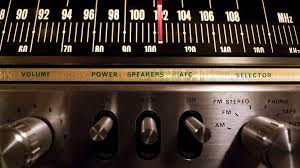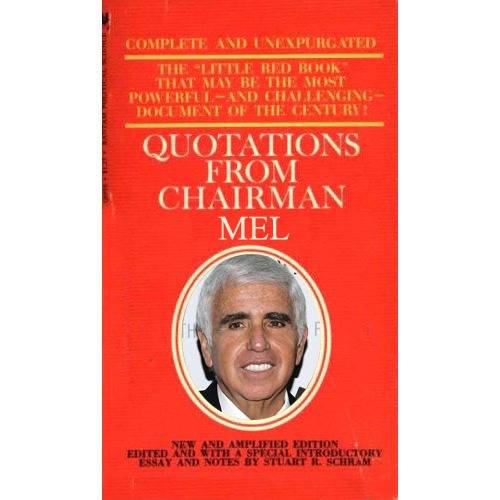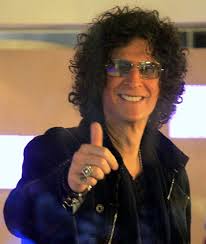OK, in the spirit of full disclosure, I did not attend the National Association of Broadcasters Convention last week in Vegas. Paul and I drew straws and….well, you can guess the result.
But I kept in close tabs with him and others about the comings and goings, those lobby bar meetings at the Wynn, and the other scuttlebutt about Alpha, Digity, CBS, and the rest of the rumor mill. One of the events I was most looking forward to – vicariously through Paul, of course – was the “Mel Karmazin Totally Unplugged Cocktails & Conversation” event. Yup, Mel one-on-one with Wall Street Journal reporter Joe Flint. I wasn’t sure exactly what the NAB was thinking when they announced this session, but I figured it would certainly be entertaining and quote-worthy.
In fact, I expected it to be one of the highlights of the convention – free food, cocktails, and Mel – a guy that most people in broadcasting haven’t heard from in years. And clearly the one executive most responsible for setting the tone for the radio industry during his days at the top of the corporate heap. From Howard Stern, indecency, NFL franchises on the FM band, and simply believing that “Content is everything” – not just “king” – Mel left an indelible footprint on a business that now finds itself in disruption, turmoil, and in need of direction.
So I was expecting the room to be packed and looked forward to reading the many stories covering this event the next day in radio’s trade publications.
But it wasn’t, and there weren’t.
And I’m both surprised and disappointed that more of the reported 103,000 NAB attendees didn’t perceive the value that comes from soaking up the bigger-than-life legend that is Mel Karmazin. Howard Stern simply called him “The Zen Master” because of his ability to cleverly strategize, make seemingly impossible deals, and usually get his way. So the fact this event was essentially non-covered by the radio press is also perplexing, and maybe says something about who the industry now deems to be newsworthy.
I worked for Mel as a consultant – first for Infinity and then CBS for the better part of 15 years – in New York, Philly, Atlanta, and other high-visibility markets. We had our meetings, our moments, some disagreements – all vividly memorable to me, and probably totally forgettable to him. I learned something from all of those encounters about focus, priorities, being direct, thinking big, the power of logic, and of course, entertainment value. And I owe a great deal of my company’s success to Mel, his faith in me, and of course, the powerful appeal of Howard Stern as I was along for the ride when his syndication juggernaut was taking off.
Fortunately, Paul’s iPhone had a full charge and he’s a good note-taker, so I’m able to pass on some of Mel’s nuggets and observations. Here are some of the witticisms and quotes that came out of this session, and apologies in advance for cleaning this up, a few edits, and a liberty or two along the way:
On the changing video and audio markets:
“There’s a video market…it’s no longer just called ‘television,’ right? Because you’ve got Netflix, you’ve got Hulu, you’ve got a whole lot of over-the-top kind of properties. Just like how radio today is an audio market. There’s a lot of people who spend time on video and then there’s a lot of people who spend time with audio. And my sense of the audio market is that it’s never been tapped.
You have companies like Apple, Amazon, Google, satellite radio, Spotify, and Pandora that are in it. So it’s really more (about) innovation and more exciting things that are going on in this audio entertainment space. And for the local radio station operators, I think they have the best opportunity, and a big opportunity, because they’re in these local communities (and) they have local sales organizations there.”
On the competitive media expansion:
“The ultimate connected car is going to be a whole lot better than today…and on the dashboard, you’re going to be able to get your local radio station. You’re going to be able to get your IP delivered. And you’re going to be able to get satellite. It’s all the same. The audience doesn’t think about it any differently. There’s nobody that’s going to sit back and say, ‘Oh, I love my local radio. I’m not even going to try listening to satellite radio.’ “Oh, my god…Pandora is a streaming service – it’s not really radio.’ I think that’s garbage. I think it is all competitive companies in the audio space.”
On the winners in the audio space:
“I think that the future of audio is very good. Who will the winners be? I don’t know. But it seems that the winners will certainly be the ones that are on-point with the consumer – what they want, when they want it, and not continuing to keep their heads in the sand.”
 On broadcast radio and music stations:
On broadcast radio and music stations:
“I think (radio) is a great service. I think it’s important, but you know what – the vast majority of the 12,000 radio stations are still playing music. And running commercials and not really serving their community any more than most other business owners.
Now there are some great radio stations that became great radio stations because they super-serve their communities. And they really are doing great things in the community. And those are great stations, and those are not the ones to worry about.
The ones to worry about are still playing ‘Stairway to Heaven’ but putting a bunch of commercials in there. But the audiences want to get that ‘Stairway to Heaven’ song without any commercials. And no one likes the commercials more than me.”
On selling to advertisers in this environment:
“I can’t control the advertisers. But when you have 45 minutes in the room with the person who is making the buying decision, I don’t want you wasting your time talking about the numbers. Because by then talking about the numbers, it doesn’t help the broadcaster. Because I can guarantee you there’s going to be more choices, more fragmentation, audiences are going to be lower – not higher.
If anybody thinks that suddenly all of these additional audio choices are just going to go away, well then how do you sell? Well, I think the way you sell…is that you sell on how you can help that advertiser.”
On attracting the best people to radio:
“It’s not easy. And it’s tough to be in the radio business today. It’s as competitive as it’s ever been. There’s not too many businesses that are tougher than the radio business.
(When I was in radio), I don’t think I had anybody who graduated from an Ivy League school working for us selling a radio advertiser. We had a whole bunch of people who graduated from Ivy League schools that worked for us on Comedy Central. They’re the writers.
(In radio), we weren’t attracting the best people. You’ve got all these people you’re competing with and you don’t have the best pool (of talent). So the industry, the NAB, or whoever, ought to figure out a way…
Teach for America came along and said, ‘You know what – we want to get better teachers. So we’re going to subsidize these teachers.’
You’re going to have to figure out a way to get better people who are up for the challenges that this industry is going to have.”
On the Internet:
I heard recently that I said something about that I didn’t believe in the Internet. So I would not allow our radio stations to stream their content on the Internet or cannibalize the main station. It would (have been) OK if you cannibalized, if you made money from that cannibalization. (But) there was no measurement of it. There was nobody paying money.
If you look at the radio revenues today, it not growing that well. Local radio and all of these IP things that are going on aren’t really helping offset what the fragmentation has done. So I think on the one hand, you want to give your consumers what they want, and if they want to get your content on the Internet, you ought to give it to them, right?”
On serving fans NFL-style:
“The NFL has been totally brilliant in how they’ve been satisfying their fans. The frustrating thing for them today is that not enough people are going to the stadiums because these other experiences are so great. But the NFL has made a deal with local radio. They’ve made a deal with national radio. They’ve made a deal with satellite radio. They’ve made a deal with whatever devices are out there. They’ve also made a deal with Verizon on having their audio through your smartphone. They want the people who want the NFL to get their content on whatever device, however they want – and they are satisfying their customer…”
On making decisions for the future:
“When I was talking to people who worked for me and they said, ‘You know, we really should do this and we’ve got to make the decision today. And I said to them, ‘YBG IBG.’ You know what YBG and IBG is? You’ll Be Gone and I’ll Be Gone.”
It’s a lot easier for someone today to say, ‘I’m going to make this decision about 2017,’ but someone’s going to have to deal with these consequences of these audiences getting more fragmented…”
“I don’t think I would have been as successful as I am or I was without Howard. I mean, he’s an extraordinary talent. There is nobody like him. Forget whether they like him or not, he’s been a success in virtually every – not virtually – every aspect of business, whether he’s writing books, making a movie, being on ‘America’s Got Talent,’ being on terrestrial radio, being able to take the audience to satellite radio. He is an amazing talent. And it gave me the opportunity to make lawyers even richer than they are.”
On dealing with Stern, indecency, and the FCC:
“Who’s deciding what’s in the public’s best interest? So I’m trying to get a merger deal done. And in order to get the deal done, you need three out of five (FCC) commissioners. So at that time, there was a Republican administration, so you have three Republicans and two Democrats. And one of the Republican commissioners says to me, ‘Mr. Karmazin, I understand you want to get a merger done, but the way I interpret the public interest, in order for you to be qualified to make more acquisitions and more mergers, this is the envelope. I want you to get Howard Stern not on the edge of the envelope but in the middle of the envelope.’
And I said, ‘Mr. Commissioner, I must be missing something. If this is the envelope, I understand I don’t want to be off the envelope, but why do I have to be in the middle?’ And he said, ‘Mr. Karmazin, if you want my vote on your merger, that’s what you have to do.’
Now I’m sitting there panicked, right? Because I need to get these deals done, and I just honestly believed that what Howard was doing – maybe some people would find in bad taste – I thought it was clearly legal. I didn’t think it was against the law.
And I totally spent millions and millions of dollars fighting (for) Howard and tarnished my reputation in the process because I was looked upon as trying to encourage indecency.”
After reading Paul’s notes and putting this post together, it occurred to me how much my personal philosophies about radio, thinking big, leadership, decision-making, valuing and creating content, defending and justifying your position and strategy, and keeping it real were shaped in large part from working with Mel’s stations and my encounters with him over the years.
Talking to other broadcasters about him elicits a rainbow of different opinions. Like it was for Howard, there are lots of 1’s and 9’s, but never a 5. And he is and will always be worth listening to.
Wish I could have been there. Wish you could have been there.
- What To Do If Your Radio Station Goes Through A Midlife Crisis - April 25, 2025
- A 2020 Lesson?It Could All Be Gone In A Flash - April 24, 2025
- How AI Can Give Radio Personalities More…PERSONALITY - April 23, 2025






Amazing read and insight guys..thanks for posting! 🙂
Appreciate it, Dave.
I still remember the day I had to leave his employ and he told me I’m “Dead” to him. Funny, but scary at the same time.
Yeah, it could run both ways. Good to hear from you, John. Thanks for the comment.
Oh the irony of embedding Mel’s picture in a book from history’s most renowned communist.
I prefer to think about it as two iconic thought-leaders. Good to hear from you, Ron.
Thanks for sharing this…..We have very much the same feelings about Mel…there were meetings with Mel that at the time I did not like, but I always loved the results………Working for him was an amazing experience.. He and Dan Mason both gave me opportunities that allow me to be where I am today..
Thanks for sharing that, Tom. He loved to work with creative, smart people, and challenged them to raise their games and think it through. I vividly remember most of the meetings/encounters I had with Mel. He kept me on my game, made me question my assumptions, and made me a better programmer and strategist. But it was never easy! Good to hear from you.
I should be surprised that Mel’s session wasn’t packed. But most attendees would rather avoid the raw truth.
Thanks for taking notes, Paul.
Thanks much, Beau.
I was surprised also, Beau. While he’s been out of radio for a long time, his impact on the business is still felt. And while it’s clear from these comments that many have mixed feelings about Mel (including me), there’s no question that he was a dynamic, visionary leader who saw the entire media landscape and how radio fit into it.
Plus, he was a strong voice for the business outside of our circles. So the room should have been packed, even if you did have to pay for the drinks.
Been investing in Mel’s companies’ since the early 90s. Very thankful for Mel and Howard. Wish Mel was still with Sirius. Maybe his influence can get Moones to work some magic and create Time Warner CBS
Here some video and a Fierce Cable story on Mel from NAB
https://www.youtube.com/watch?v=Wx6epe7Bsfw&app=desktop
https://www.fiercecable.com/story/karmazin-cbs-and-time-warner-inc-need-merge/2015-04-14
Thanks so much for posting about my hero Mel.
Thanks for the video (a lot of the same quotes). Appreciate it.
From following Mel’s career, I just get the feeling he wants back into the media business. This is the second time he has mentioned a possible Time Warner CBS combo, and Moonves is a friend of his and longtime business associate when Mel was running CBS. Time Warner is a NY based media company with an independent board, hmmmm……I’m just speculating. Your thoughts Fred?
Here is a clip from January when Mel talked CBS Time Warner as well
https://www.cnbc.com/id/102320949
I don’t speculate about these things but I will say that Mel looked and sounded great (thanks for the video link). He doesn’t look like he’s ready to hang out at Starbucks with the guys.
one f the highlights of my life was working for wysp in the late 80’s early 90’s. Mel would come to philly and always say hi..ask what im hearing…did I sell anything today? Mel im an intern…mel replied with that attitude you always will be
Good to hear from you, Pat, and thanks.